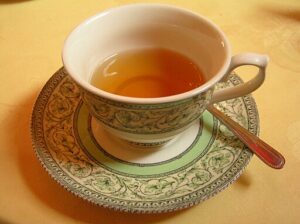By Janice Lindsay, Contributing Writer

One cold dark morning, in spite of everything, I woke up.
The news of the world was disturbing. Wars and suffering. Angry people. Voices of calm and reason struggling to be heard.
Closer to home, on a smaller, personal scale, my car was in the shop about to enjoy the type of attention that buys the mechanic a new boat. My computer was in another shop while the technician tried to determine why it had suddenly developed the unsettling habit of turning itself on and off.
Like any normal adult, I longed to curl myself into a tiny ball, pull the covers over my head, and not come out until – until – well, until some other time. Instead, I got up and made myself a cup of tea.
If you’ve ever watched a TV drama featuring British persons, you’ve learned that a cup of tea cures every ill, or at least makes every problem seem more manageable.
“What’s that you say, Mrs. Jones? The demolition crew obliterated your house instead of the eyesore next door, destroying your grandmother’s antique jewelry that you planned to sell to finance your dream home on the Riviera? Never mind, I’ll make you a nice cup of tea.”
My husband and I once hiked the hilly Cornwall coast in southwest England with our friends John and Brenda, a British couple. As we descended a steep slope, Brenda slipped and fell, with her arm twisted beneath her. It was clear she had broken her wrist.
We climbed to a high spot, located a distant farmhouse, and trudged gingerly out of the hills. On the road, we hailed the driver of a farm truck who had room for just one passenger. By the time we three had walked the half-mile to the house, all was as well as could be expected: Brenda was already settled at a stranger’s kitchen table, enjoying a nice cup of tea.
At the hospital, while Brenda’s wrist was X-rayed, we waited near the hospital’s tiny refreshment kiosk. A middle-aged gentleman approached the shop, pushing a wheelchair that cradled a frail old woman, perhaps his mother. He lifted her out of the wheelchair and sat her in a booth. He bought her a cup of tea, added sugar and milk, and sat with her while she drank. She stared straight ahead, saying nothing, reacting to nothing, just drinking her tea.
When she finished, he lifted her into the wheelchair. As they headed back toward her room, he said, “Well at least you’ve had your tea.” Can’t walk, can’t talk, maybe doesn’t know who she is, or where she is, but at least she’s had the comfort of her tea.

Laurel F from Seattle, WA, CC BY-SA 2.0
The British have it right. Tea power.
The power of the “cuppa” to soothe and refocus does not lie only in the taste of the tea, its calming warmth, or the caffeine uplift. The power lies in the familiar ritual of water just-off-the-boil poured into the mug or teapot – sugar? – milk? The power lies in serving and being served. It lies in sharing the traditional rite with family and friends and strangers who need your compassion. Even if you’re alone, the ceremony of tea creates a deliberate pause that gives your thoughts and emotions time to regroup.
Make yourself a cuppa. It might seem as if the world is falling apart, but at least you’ve had your tea.
Contact jlindsay@tidewater.net
RELATED CONTENT:
Peace. Love. Ukulele. (fiftyplusadvocate.com)
Always one more (weird) thing (fiftyplusadvocate.com)
Evil plastic thingies and other modern conveniences (fiftyplusadvocate.com)











